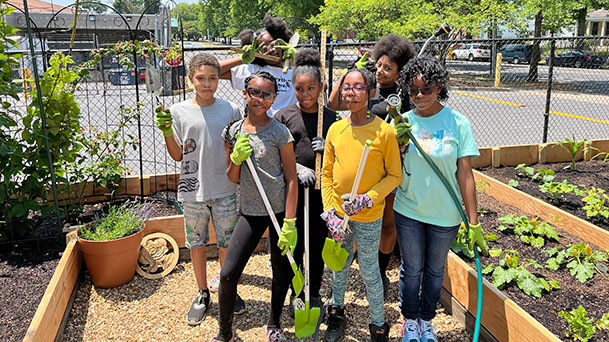Programs
Community workers, public health officials and urban planners are increasingly concerned about rising rates of serious physical and psychological conditions—such as cancer, heart disease, diabetes, asthma, depression, and emotional stress—in city populations across the globe. Many of these illnesses are exacerbated by obesity which is, in turn, linked to low levels of physical activity and poor eating habits – particularly the overconsumption of fats and sugar and insufficient intake of fresh vegetables and fruit. Community gardens can provide access to nutritionally rich foods that may otherwise be unavailable to low-income families and individuals. Our programs are designed to help address these issues by increasing access, skills, and resources needed to grow food in the community and regenerate urban green spaces.
Urban Youth Gardening
Gardening is a healthy, inexpensive activity for young people and adults that can bring them closer to nature and allow them to interact with each other in a socially meaningful and physically productive way. Through our annual urban gardening project, the Good Foodie provides activity-based food and nutrition education. This project offers a unique opportunity to help Washington, DC metropolitan area youth and their families to prepare for, and complete, a special project benefiting their individual and community health and well-being. Through our urban gardening project, we not only provide families with the freshest food possible right from their own homes or communities, we also reduce ”food miles” that are associated with transporting produce for hundreds of miles from the farms to the urban area, and our program educates urban families about how to save substantial amounts of money by growing their own fruits and vegetables instead of buying them retail. For many urban dwellers, starting their own garden may seem to be a challenging task, but we make it easy and ultimately more rewarding for them.
Gardening for Ability
Gardening is a rewarding activity that brings a sense of accomplishment and relaxation. It can also offer numerous physical, mental, and emotional benefits, such as improved mobility, strength, flexibility, mood, and self-esteem. Additionally, gardening is a therapeutic activity that can be enjoyed by people of all abilities. Through our accessible gardening project, we help people with disabilities (who may face various barriers, such as limited mobility, chronic pain, sensory issues, or visual impairments) to overcome these challenges and make gardening accessible and enjoyable. We help with choosing the right plants, using ergonomic and lightweight tools that are easy to grip and handle, and designing gardens to suit unique abilities and needs (e.g., raised beds, vertical gardens, or container gardens to minimize bending, kneeling, or reaching).

